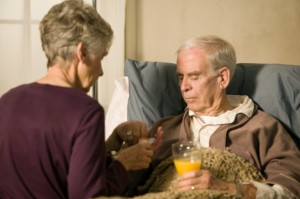An estimated 10,000 baby boomers reach age 65 every day. With this aging avalanche, family members are pressed into a caregiver role. This can be challenging, exhausting and isolating.
The stress caregivers feel can make them to eventually become burned out – a condition not to be taken lightly. Yet many caregivers – even when they have access to safe options for help – still come up with excuses to put off (or actively refuse) assistance. You ask, “why would they do that?” Following are a few of the reasons:
- The instinct to protect: While many come to terms with the fact that they can’t make their loved one well, they still want to be the person to provide care and protection. It’s a protective instinct that’s hard to overcome.
- Guilt – the caregiver’s unwelcome companion: Sometimes guilt can enter the picture – even though it’s often not recognized and most of the time undeserved. Many feel that their position as a spouse, adult child or even a parent, requires us to personally provide all the care needed. Guilt is always a useless emotion, yet it’s a common problem for caregivers.
- An unhealthy sense of competition: Adult children caring for their parents may still be trying to earn their place in their parents’ hearts as the one who did the most. Sibling rivalry, even in healthy families, seldom completely disappears. The bulk of elder care, even in large families, frequently falls to one person – the daughter. However, there are caregivers who shut out other family members. Most likely, they subconsciously want to be the family hero.
- Stranger danger: We don’t trust hired caregivers, whether they are providing in-home care, assisted living, skilled nursing or any other kind of care. We’ve heard horror stories from people who have had terrible experiences with hired care. This makes us afraid of what may happen if we are not present to monitor our loved one’s care at all times.
- Financial woes: Our medical system still lacks many safety net features such as Medicare and Medicaid to help keep people in their own homes with the assistance of paid help. So we fear financial problems.
If you are a caregiver, you might often feel that your world has been turned upside down. It is important to “maintain your sanity” and take time to look after yourself. Damaging health effects for those between the ages of 66 and 96 who provide care for a loved one include a 63% higher risk of dying than those who are not providing care.
♦ FIND WAYS TO EXERCISE – Try to exercise with the person you are caring for – they need it too! Talk a walk, watch an exercise video, or join an exercise class.
♦ EAT NUTRITIOUSLY – But that doesn’t mean it has to be complicated Try eating simpler meals, find simple recipes (as long as they don’t contain a lot of processed food) or seek a consultation with a dietitian if you need specific advice.
♦ KEEP YOUR SOCIAL LIFE: Maintain relationships. If you don’t have the time or freedom to get out to socialize, try making use of technology such as Skype, e-mail, Facebook or a good old phone call.
♦ GO SEE YOUR DOCTOR: One of the worst mistakes a busy, stressed caregiver can make is to put aside their own health needs and concerns. Please keep in mind that if your break down, so does your ability to care. Caregivers with high blood pressure, diabetes, heart disease or high cholesterol should follow the strict regimens offered by their physicians.
♦ RELAX AND RECHARGE: Do a favorite calming activity – reading, gardening, soak in a bath, knit, pray or do some meditation. Laughter can also be the best medicine. Share a humorous story with a friend or watch a comedy. Do something stimulating that you enjoy – crossword puzzles, Sudoku, anything that keeps you mentally active.
♦ DON’T BE AFRAID TO ASK FOR HELP: Providing care for a loved one can be a 24/7/365 requirement, and it’s impossible to manage the responsibility alone.
Keep in mind that if you aren’t looking after yourself, you may not be providing the best possible care for your loved one.

